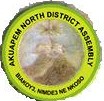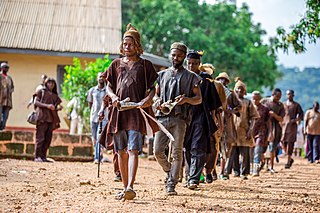
Hohoe is a town and the district capital of Hohoe Municipality located in the Volta Region of Ghana. It is about 78 km (48 mi) from Ho, the regional capital and 220 km (140 mi) from Accra, the national capital. The population of Hohoe Municipality, according to the 2010 Population and Housing Census, is 167,016 representing 7.9 per cent of the total population of the Volta Region. It comprises 52.1 per cent females and 47.9 percent males.
Kpando is a town and capital of Kpando Municipal District in the northern Volta Region of Ghana. It is near the north eastern arm of Lake Volta and the Togo border. Kpando is the fifty-fourth most populous place in Ghana, in terms of population, with a population of 28,334 people. Kpando is connected by ferry and road to Gbefi, Hohoe, Ho and Dambai. It is about a 4-hour journey from Accra. The Kpando Municipality is a district in the Volta Region, and one of the oldest administrative districts in Ghana.

South Dayi District is one of the eighteen districts in Volta Region, Ghana. Originally it was formerly part of the then-larger Kpando District on 10 March 1989, until the southern part of the district was split off by a decree of president John Agyekum Kufuor on 19 August 2004 to create South Dayi District; thus the remaining part has been retained as Kpando District. The district assembly is located in the western part of Volta Region and has Kpeve as its capital town.

Akropong is a town in South Ghana and is the capital of the Akuapim North District, a district in the Eastern Region of South Ghana. This town is known for producing snails and palm oil. Akropong has a 2013 settlement population of 13,785 people.

In precolonial Ghana, infectious diseases were the main cause of morbidity and mortality. The modern history of health in Ghana was heavily influenced by international actors such as Christian missionaries, European colonists, the World Bank, and the International Monetary Fund. In addition, the democratic shift in Ghana spurred healthcare reforms in an attempt to address the presence of infectious and noncommunicable diseases eventually resulting in the formation of the National Health insurance Scheme in place today.
Togbe Ngoryifia Céphas Kosi Bansah, also known as Céphas Bansah, is the Ngoryifia of the Gbi Traditional area of Hohoe, Ghana.
Adidome is a small town and is the capital of Central Tongu district, a district in the Volta Region of Ghana. According to the Ghana Statistical Service 2010 Population and Housing Census, the population of Adidome was 7,587. The distance from Adidome to Ghana's capital, Accra is approximately 144 km. The town has a Senior High School called Adidome Senior High School. Adidome is not only noted for its Senior High School but also the Adidome Farm Institute.
Akuapem-Akropong is a town in the Eastern region of Ghana. The town is known for being a site of mission station run by the Basel Mission, the first institution of higher learning, when Presbyterian Training College was established in 1848, Akropong School for the blind established in 1945, and Okuapeman Secondary School. The political system used in this town is the institution of Chieftaincy. The school is a second cycle institution. This town is also the capital of the Akuapem Traditional Area
There are four orders in Ghana: Order of the Star of Ghana, Order of the Volta, Medal for Gallantry and Grand Medal. These were instituted in 1960 as a replacement for the British honours system that was conferred under the Gold Coast and the Dominion of Ghana. The first National Honors and Awards ceremony under the new system was administered by Ghana's first president Kwame Nkrumah.

Togbe Afede XIV is the Agbogbomefia of the Asogli State, President of Asogli Traditional Area, and former President of the National House of Chiefs.

The Kingdom of Dagbon is the oldest and one of the most organised traditional kingdoms in Ghana founded by the Dagomba people (Dagbamba) in the 15th century. During its rise, it comprised, at various points, the Northern, Upper West, Upper East, Savannah Region and North East regions of present-day Ghana. It also covered portions of Burkina Faso, North East Ivory Coast and North West Togo. Since Ghana's independence in 1957, the Kingdom has assumed a traditional, customary role like Ghana's other kingdoms and ethnic states.
Abutia, also: Abutia Area, is a Kingdom in West Africa, in the East of the Republic of Ghana, Volta Region.

John Sebiyam Nabila is a Ghanaian politician, geographer, philanthropist and academic. He is Chief of the Kpasenkpe traditional area in the North East Region of Ghana. He served as the president of the National House of Chiefs from 2008 to 2016. He was a member of the Ghana National Petroleum Corporation board. He was the Minister for Information and Tourism in the Limann government.

The Asorgli State is a traditional area in the Volta Region of Ghana. It covers an area from Atimpoko in the west through Ho, to Aflao in the east. The traditional area has several Paramount Chiefs who swear allegiance to the Agbogbomefia - King of the Asɔgli State.
St. Francis College of Education is a teacher education college in Hohoe. The college is located in Volta Zone. It is one of the about 40 public colleges of education in Ghana. The college participated in the DFID-funded T-TEL programme.
The chieftaincy institution in Ghana is a system that structures and regulates the activity of local chieftains in the Ghanaian society and state. This institution served as the governing structure of various societies in Ghana prior to European colonisation.
The Gbidukor Festival is an annual festival celebrated by the chiefs and people of Gbi in the Volta Region of Ghana. It is usually celebrated in the month of November. It is claimed the festival rotates between Hohoe and Peki.

The Western Togoland Rebellion is an ongoing separatist revolt led by the Ewe nationalist organization Western Togoland Restoration Front (WTRF) against the government of Ghana. The group seeks the independence of former British Togoland.
His Royal Highness Togbega Gabusu VI was the Fiaga of the Gbi Traditional Area in Ghana. The Gbi Traditional Area is popularly known as the Hohoe Area with Hohoe, its capital town, doubling as the municipal capital. The area is also sometimes referred to as Gbi Dzigbe.









